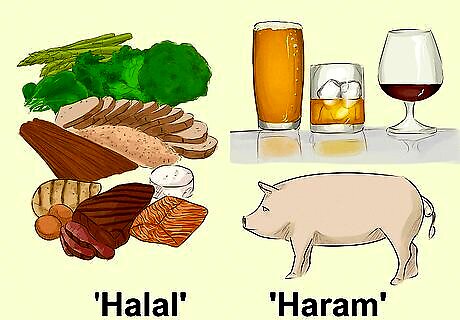
views
X
Research source
largest religion in the entire world? This guide will help you study Islam.

Find out if there are any mosques in your area. The mosque is the local center for spiritual guidance, the focal point for worship and seeking knowledge. Make an appointment to go to the mosque, and meet with the Imam (religious leader) there. He should provide you with plenty of information about Islam. Prepare yourself with a list of questions that will help you better understand the religion of Islam and address any doubts you may have. For example, you may wish to ask about how Muslims pray, the Muslims dress code or why Islam sets limits to gender interaction. If you have children and are thinking of converting, the imam will be able to advise about their upbringing as Muslims and the adjustments that will need to be made.

Find out if the mosque is running any activities or courses for people trying to find out more about Islam. These are a great way to learn in a friendly environment with other people motivated to increase their knowledge of the religion. Non-Muslims are usually very welcome to attend such events as long as they are open to finding out more and are respectful towards Islam. Most mosques run single-gender courses and study circles suited to various ages and levels of religious knowledge, including new Muslims and their children. Muslims are required to study the religion of Islam throughout their lives, so that they can better understand and follow its beliefs and practices.

Go to your local library, mosque or Islamic bookstore and see if they have a copy of the Quran that you can access. You may be interested in the Arabic version or an English translation instead. Try to choose a translation that you can understand. Some are quite old and are hard to understand, while others are too in-depth and may be intimidating to non-Muslims and new Muslims. Sahih International is a good option. Remember that translations are fallible and are subject to error. When in doubt, consult multiple translations (or ideally, the original Arabic). Try to ponder over the meaning and significance of the words you are reading, always remembering that they are the words of God (known as Allah in Islam). You can also listen to beautiful recitations from the Qur'an on platforms such as YouTube, often with sub-titles. Understand the importance of reading, reciting and memorizing the Qur'an to all Muslims, starting from a young age.

Learn about why Muhammad (peace be upon him) is so important for Muslims. He is the last Prophet and messenger of Allah. You should read the seerah (biography) of the Prophet Muhammad (peace be upon him) to better understand his life and journey of spreading Islam, how he introduced its laws to protect society and corrected those who transgressed against them. Muslims seek to follow the actions of Prophet Muhammad (peace be upon him) in the daily lives, especially through his acts of worship. This is known as the Sunnah. Muslims express their love of Prophet Muhammad (peace be upon him) every day by asking Allah multiple times to bless him. Studying narrations of the sayings of Prophet Muhammad (peace be upon him), known as ahadith (singular hadith), is very important to Muslims.

Learn about the five pillars of Islam. They are the fundamental acts of worship that must be performed during their life by every Muslim. They are: The declaration of faith. Praying five times a day. Giving charitable donations. Fasting during Ramadhan. Going on a pilgrimage to Mecca at least once in a lifetime, should one have the means to do so.

Find out about the six basic beliefs that all Muslims hold, and the importance of focusing on the afterlife for all Muslims. Belief in the oneness of God. Belief in the Angels, unseen beings who worship God and carry out His orders in this world. Belief in God's holy books, the Torah, Bible and finally the Qur'an. Belief in the prophets sent by God to reveal His guidance, ending with Muhammad. Belief in the Day of Judgement, when all humans will either be rewarded with heaven or sent to the fire of hell depending on whether they have chosen to follow or reject God's guidance. Belief that whatever happens in one’s life is preordained by God and should be accepted with patience or gratitude.

Understand that Muslims believe they have been created by God for the sole purpose of worshiping Him and the best way to do that is to obey Him and refrain from disobeying Him. The mindset of the Muslim should be a balance between hope of attaining Jannah (Heaven) and fear of displeasing God and being sent to Jahannam (Hellfire). Success in this life and the next comes by accumulating good deeds and avoiding sins. Formal daily worship takes many forms including ritual prayer (salah), voluntary additional prayers, duas (invocations), dhikr (being mindful of God, typically through repetition of beautiful phrases), reciting the Qur'an and fasting in Ramadhan. Additionally, acts such as obeying the dress code, giving alms, following a halal diet, seeking Islamic knowledge and even procreating and raising children within a halal marriage are seen as acts of worship. Muslims are taught that God sees everything and they must acknowledge before God and seek forgiveness for every sin committed, no matter how small, or that sin will have to be accounted for on the Day of Judgement. EXPERT TIP Mekaeel Mohsin Mekaeel Mohsin Imam Shaykh Mekaeel is an Imam at the Islamic Community of Salinas in Salinas, California. He is the founder of the Voyagers of Knowledge YouTube channel, which creates Islamic educational content. He attended the Islamic University of Madinah and earned a degree from the school of Da'wah and Usuluddeen. Mekaeel Mohsin Mekaeel Mohsin Imam Controlling your desires is an ongoing test of faith. Embracing Islam doesn't mean you'll automatically align with it. Stay strong when your faith conflicts with what you want. It's a test, yes, but also a chance to grow. Just be aware of these tensions, and you can handle them well.

Learn about the Islamic legal system (known as Shari'ah), which includes laws covering formal worship, beliefs, morals, manners, contracts and finance, and includes a system of penalties for those that disobey them. Study the Islamic system of dietary laws. Certain foods are either halal (permissible) or haram (forbidden). Animals must be slaughtered according to Islamic teachings for them to be permissible, although consuming some animals, such as pigs, are categorically forbidden. Learn about the compulsory acts of worship, the importance of completing them correctly and the consequences of not doing so. Find out about the actions that are tolerated in western society but are forbidden in Islam, such as drinking alcohol, backbiting and sexual activity outside marriage. Study why Islam's laws and prescribed punishments (Hudud) have never changed since Islam was founded.

Learn about the different sects of Islam. Just as Christianity is divided into numerous denominations, Islam has also become divided into numerous sects. The main denomination is Sunni, with Shia being the second-largest one. Sunnis believe that Abu Bakr was Muhammad's successor, while Shias disagree and believe that Ali was the rightful successor. A few religions such as the Bábism, the Bahá'í Faith, and Druzeism have evolved from Islam but preach new concepts (e.g. new prophets and scriptures) which are deemed heretical by Muslims. The Qur'an teaches that Islam is the final and only religion acceptable to Allah (3:85).

Learn about the different schools of jurisprudence. Also known as madhhabs, within the two major denominations, there are several schools that differ in how they interpret rulings from the Qur'an and ahadith (sayings of the Prophet). Within Sunni Islam, the four common ones are Hanafi, Maliki, Shafi'i, and Hanbali, each founded by prominent jurists. Within Shia Islam, the major school is Ja'fari, which is further divided into branches.

Learn about the two Muslim holidays. The two official Muslim holidays are Eid-ul-Fitr and Eid-ul-Adha; the former celebrates Ramadan being finished and literally means "festival of breaking the fast". Eid-ul-Adha celebrates the Prophet Ibrahim's willingness to sacrifice his son, who was replaced by a sheep, which was then slaughtered. It means "feast of the sacrifice. Find out why Muslims do not celebrate any other holidays, birthdays, festivals, anniversaries or the like, beyond the two Eids.




















Comments
0 comment